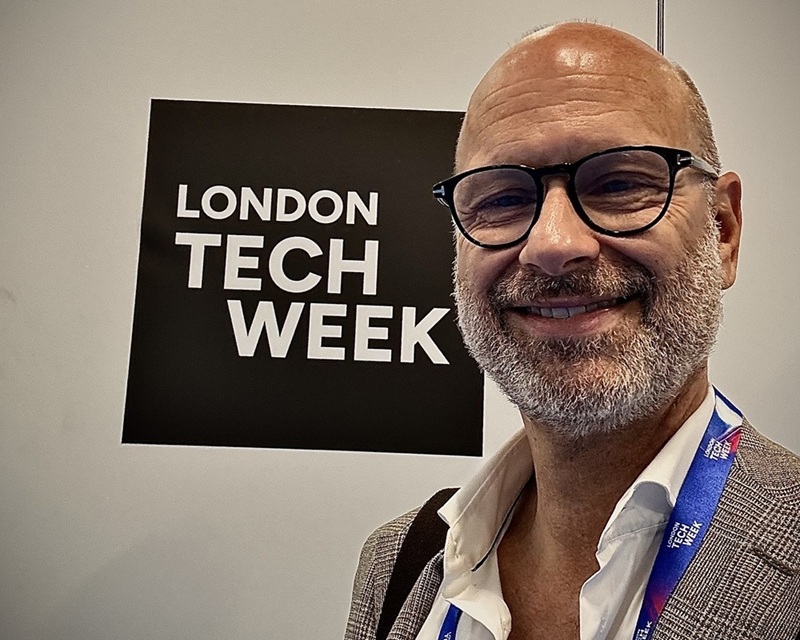I sold my company. Moved to London. Retired (sort of). And last week, I did what every ex-founder does when they still feel a pulse when they hear the word “product-market fit”:
I went to London Tech Week.
It was loud. It was global. Kicked off with UK Prime Minister Keir Starmer on stage and Nvidia’s CEO, promising billions in AI infrastructure and a digitally upskilled Britain.
Big energy. Bold headlines.
And yet, as I walked the expo floor, I kept asking myself:
“Does anyone here actually build anything that works?”
I saw beautifully branded booths. Well-rehearsed founders. Slick decks.
One startup was promising advanced blood testing subscriptions with deep biomarker insights. Another claimed to let you spin up AI agents to perform “any task” in minutes.
Naturally, I wanted to see more.
So I went to their websites… and was greeted with the same thing in both cases:
“Join our waitlist.” No product. No pricing. No signal they’ve shipped anything at all.
Let me translate that: “We’ve built a vision, but not a business.”
This wasn’t a one-off. It was the norm.
And it tells you everything you need to know about the current founder mindset: presence is prioritized over progress.
Scene 1: Polished Panels, But Pitch-Drunk Founders
The panels were flawless. The production value was premium.
But beneath the surface, I heard a lot of founder-speak that made my old operator instincts twitch:
“We’re pre-revenue but post-traction.”
“We’re validating monetization.”
“Our next round will unlock growth.”
No it won’t.
I spoke to too many founders who were chasing runway instead of revenue. Decks instead of distribution. Their “traction” was engagement on LinkedIn posts – not paying customers.
If you don’t have your first 100 customers, why are you roaming around London Tech Week?
To raise money? There are better avenues – and smarter ones.
To get publicity? That can backfire hard and fast when a journalist or investor asks, “Can I try it?” and you don’t have a product.
It’s not just premature scaling. It’s delusional signaling, like dressing for a wedding when you haven’t even proposed yet.
Takeaway for Founders:
Start with the problem.
Not the pitch, not the brand, not the slide deck. The real problem – not the one you think sounds hot. If the problem isn’t painful enough to make someone pay you to solve it, there’s no business.
No problem = no customer = no traction = no funding = no exit.
If you can’t clearly explain:
- Who your customer is
- What you solve for them
- How you make money doing it
…you don’t have a startup. You have a hobby with a pitch deck.
Scene 2: Government Grant Chasers
There’s this dangerous narrative spreading in the UK founder ecosystem:
“If we just get that InnovateUK grant / NHS pilot / AI booster voucher, we’ll be good.”
No. You won’t.
The government handing out grants is like an Instagram influencer pitching for likes – a little sad, and it never really turns out to be as good as we all thought.
I met several founders who were months into paperwork and pitch prep for public sector funding – but hadn’t spoken to a customer in weeks.
You’re not building a business. You’re playing bureaucratic lottery.
Takeaway for Founders:
Use grants only to accelerate something that’s already working, not as a lifeline for something that isn’t.
And more importantly:
Don’t let the vague promise of a possible grant distract you from your core mission:
Sign up customers. Solve their problems. Make money.
The market doesn’t care how much you raised. It cares what you built.
Scene 3: AI Wrappers and Investor FOMO
Everyone is building an “AI company” now. But most are just wrappers – a light UX layer slapped over ChatGPT or Claude, packaged with buzzwords and a slick landing page.
I’m not judging from the sidelines on this one. At Tomco Capital, we made the same mistake.
We launched our portfolio company ERPlingo as a ChatGPT-powered SAP support platform. We thought it was the coolest thing since sliced bread. And to be fair, our prompt engineering is solid. Better than most.
But here’s the truth:
ChatGPT is already “good enough” at everything.
Getting someone to stop using ChatGPT and switch to your platform – no matter how niche – is tremendously difficult. You’re not just selling features. You’re trying to overcome default behavior.
We’re actively fixing that right now at ERPlingo.
If you’re building the next hot AI tool, you need to be doing the same – or you’ll be just another wrapper that demoed well but never stuck.
Takeaway for Founders:
AI isn’t your differentiator anymore. Your results are.
Ask yourself:
- Are you solving a problem 10x better than ChatGPT does out of the box?
- Is your tool sticky, indispensable, and revenue-generating?
- Would you switch if you were the customer?
If the answer is no, you’re not building a product – you’re just giving OpenAI free distribution.
Final Thoughts From the Balcony
Being a retired founder gives you a different lens.
You see the games being played. The narratives being sold. The self-delusion being scaled.
London Tech Week had all the ingredients: ambition, innovation, capital. But the most successful founders I know aren’t chasing buzz. They’re ruthlessly focused on fundamentals:
- Solve a painful problem.
- Get someone to pay you for it.
- Build systems that scale you out of the equation.
That’s it. That’s the game. And it’s still undefeated.
For Founders Still in the Arena
You don’t need another round. You need a win.
Pick one number that matters – ARR, retention, CAC payback – and kill anything that doesn’t move it.
If you want someone to call your bluff, rip apart your strategy, and help you scale like someone who’s already exited: I coach a small handful of serious founders each year.
If not, just build something great. And email me when you exit.



